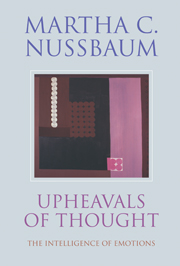Book contents
1 - Emotions as Judgments of Value
Published online by Cambridge University Press: 05 June 2012
Summary
Emotions, I shall argue, involve judgments about important things, judgments in which, appraising an external object as salient for our own well-being, we acknowledge our own neediness and incompleteness before parts of the world that we do not fully control. I therefore begin with a story of such evaluations, a story involving fear, and hope, and grief, and anger, and love.
NEED AND RECOGNITION
In April 1992 I was lecturing at Trinity College, Dublin. Because my mother was in the hospital convalescing after a serious but routine operation, I phoned at regular intervals to get reports on her progress. One of these phone calls brought the news that she had had a serious complication during the night, a rupture of the surgical incision between her esophagus and her stomach. She had developed a massive internal infection and a fever, and, though she was receiving the best care in a fine hospital, her life was in jeopardy. This news felt like a nail suddenly driven into my stomach. With the help of my hosts I arranged to return on the next flight, which was not until the next day. That evening I delivered my scheduled lecture, on the subject of the emotions – a blueprint for the series of lectures on which this book is based. I was not the exuberant self-sufficient philosopher delivering a lecture – or rather, not only that – but at the same time a person invaded by the world, barely containing tears.
- Type
- Chapter
- Information
- Upheavals of ThoughtThe Intelligence of Emotions, pp. 19 - 88Publisher: Cambridge University PressPrint publication year: 2001
- 4
- Cited by



